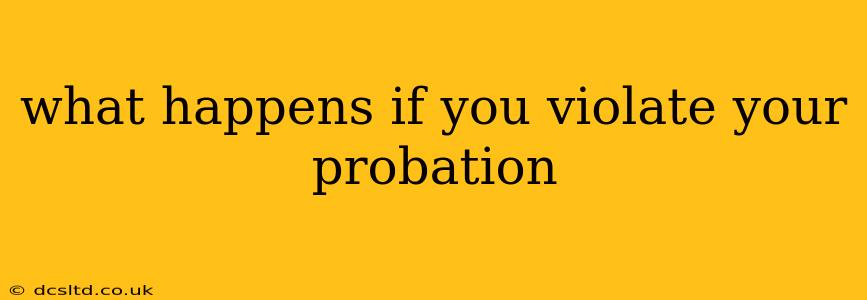What Happens If You Violate Your Probation?
Violating probation can have serious consequences, significantly impacting your life and freedom. The specifics depend on the nature of the violation, the severity of the original offense, and the judge's discretion. However, several common outcomes exist. Understanding these potential repercussions is crucial for anyone currently on probation.
What constitutes a probation violation?
A probation violation occurs when you fail to comply with the conditions set by the court during your probationary period. These conditions can vary widely but often include:
- Regular check-ins with your probation officer: Missing appointments or failing to report significant life changes can be considered violations.
- Maintaining employment or seeking employment: Unemployment without a valid reason might lead to a violation.
- Avoiding substance abuse: Positive drug tests, relapse into substance abuse, or failure to attend mandatory treatment programs are common violations.
- Abiding by curfews: Violating curfew stipulations can result in probation revocation.
- Staying away from certain individuals or locations: Contacting forbidden individuals or entering prohibited zones is a direct violation.
- Following any specific directives: This might include attending anger management classes, completing community service, or undergoing mental health evaluations.
What are the potential consequences of a probation violation?
The consequences can range from minor sanctions to imprisonment. Here's a breakdown:
- Warning: For minor infractions, a probation officer might issue a verbal or written warning. This is often a first-time occurrence or for relatively insignificant breaches.
- Increased Supervision: More frequent check-ins, drug tests, or mandatory meetings might be imposed.
- Community Service: You might be required to perform additional community service hours.
- Fines: Monetary penalties are common for probation violations.
- Revocation of Probation: This is the most serious consequence. Revocation means your probation is terminated, and you're sent to jail or prison to serve the original sentence.
What happens during a probation revocation hearing?
If a probation officer believes you've violated your probation, they'll file a report with the court. This triggers a revocation hearing. At this hearing:
- Evidence is presented: The probation officer presents evidence of the violation.
- You have the right to legal representation: It's crucial to have an attorney present to defend you.
- You can present your side of the story: You have the opportunity to explain your actions and offer mitigating circumstances.
- The judge makes a decision: The judge decides whether you violated your probation and what the appropriate punishment should be.
Can I avoid probation revocation?
While there's no guarantee, taking proactive steps can improve your chances of avoiding revocation:
- Full cooperation with your probation officer: Maintain open communication, promptly attend meetings, and be honest about any challenges you face.
- Strict adherence to all conditions: Follow all the rules and regulations outlined in your probation agreement meticulously.
- Seeking help for underlying issues: If substance abuse, mental health problems, or other issues contribute to your violations, actively seek professional help.
- Legal counsel: Consult an attorney immediately if you face a potential violation. They can advise you on your rights and help you build a strong defense.
How long does the probation revocation process take?
The timeframe varies depending on court schedules and the complexity of the case. It can range from several weeks to several months.
What are some examples of probation violations?
Examples include failing to report to your probation officer, testing positive for drugs, committing a new crime, associating with known criminals, or violating a curfew. The specifics are always defined in the individual probation agreement.
In conclusion, violating probation carries significant risks. Understanding the potential consequences and taking proactive steps to avoid violations is crucial for successful completion of probation. If you are facing a probation violation, seeking legal counsel is highly recommended.
